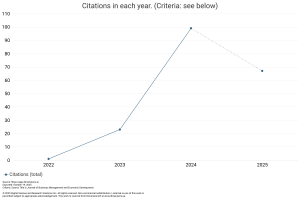Economic Innovation for Global Food Crisis: Technology-based Sustainable Solutions Review
DOI:
https://doi.org/10.59653/jbmed.v2i01.574Keywords:
Global Food Crisis, Food Security, Smart Farming, Technology SolutionAbstract
One of the biggest problems confronting humanity in the twenty-first century is the global food crisis. Global food security is becoming more and more precarious as population growth picks up speed and climate change puts agricultural sustainability and food security in jeopardy. Technology is an important factor for increasing sustainable food systems in order to accomplish this goal. Smart Farming concept combines sensors, data analytics, artificial intelligence, Internet of Things (IoT), and information and communication technology (ICT). In this research paper, the researchers' method of gathering data is documentation studies. This research aims to review technologies that could be utilized to overcome the global food crisis, one of which is smart farming. The society is expected to contribute to collective efforts to create a world free of starvation and abundant food for all through this understanding of smart farming.
Downloads
References
Achard, S. (2023). Vietnam and Korea Join Forces To Develop Smart Farms.
Amri, C., & Muttaqin, M. (2022). Dampak Krisis Pangan Terhadap Indonesia. Post Pandemic Economy Recovery, 32–34.
Arizona State University. (2023). Vietnam Smart Agriculture.
Azma, M. K. (2023). Sistem Smart Farming, Eskalasikan Pertanian dengan Teknologi.
B, Muslim et al. (2022). Inovasi Smart Farming Dalam Pemilihan Jenis Tanaman Pangan Berdasarkan Kondisi Lahan (J. A. Kardika (ed.)). Tanesa.
Clapp, J. (2009). The global food crisis: Governance challenges and opportunities. In The Global Food Crisis: Governance Challenges and Opportunities (Issue February). https://doi.org/10.5860/choice.47-4520
Deere, J. (2020). GPS technology will continue to transform agriculture.
Dewi et al. (2022). Smart Farming Teknologi Monitoring Produksi Dan. Jurnal Sistem Komputer Musirawas, 7(1), 9–11.
Dewi, G. P., & Ginting, A. M. (2012). Antisipasi Krisis PanganMelalui Kebijakan Diversifikasi Pangan. Jurnal Ekonomi & Kebijakan Publik, 3(September 2011), 65–78.
Do, L. (2023). Da Lat town wins $3 mln South Korean grant for smart agriculture project.
Fai. (2022). Food Crisis Definition of Causes and Treatment.
Flynn, S. (2021). Will AI Replace Farmers? Yes, and No.
Hau, M. (2023). Korea grants USD 3 million to develop smart agriculture in Da Lat.
Henderson, D. (2021). 7 critical ways that technology can boost food safety and reduce risks.
Hermawan, E., & Sulastri, R. (2023). Pemberdayaan Masyarakat: Pentingnya Pemenuhan Kebutuhan Dasar Masyarakat. Distingsi: Journal of Digital Society, 1(3), 1–6.
International Plant Nutrition Institute. (1999). Functions of Phosphorus in Plants. Better Crops, 83(1), 6–7.
Javaid, M., Haleem, A., Singh, R. P., & Suman, R. (2022). Enhancing smart farming through the applications of Agriculture 4.0 technologies. International Journal of Intelligent Networks, 3(September), 150–164. https://doi.org/10.1016/j.ijin.2022.09.004
Karssing, S. (2022). Innovation in Agriculture and Smart Farming Technologies for Sustainable Agricultural Development.
Nainggolan, K. (2011). Persoalan pangan global dan dampaknya terhadap ketahanan pangan nasional. Pangan, 20(1), 1–13.
Nguyen, V. H. (2023). Introducing Viko Hung Nguyen. Viko Hung Nguyen. https://vikohungnguyen.vn/gioi-thieu/gioi-thieu-viko-hung-nguyen/
Nilamsari, N. (2014). Memahami Studi Dokumen Dalam Penelitian Kualitatif. Jurnal Wacana, 13(2), 177–181.
Parent, S. (2023). How Does Humidity Influence Crop Quality?
Pratama, R. A. (2022). G20 JFAMM, Kolaborasi Atasi Kerawanan Pangan.
Rachmawati, R. R. (2021). Smart Farming 4.0 Untuk Mewujudkan Pertanian Indonesia Maju, Mandiri, Dan Modern. Forum Penelitian Agro Ekonomi, 38(2), 137. https://doi.org/10.21082/fae.v38n2.2020.137-154
Rifainy, A. H., Benhart, J., Mostar, R., Maulana, R., & Yudawisastra, H. G. (2023). Sustainable Aquaculture Ecosystem Solutions In E-Commerce Business. Jurnal Ilmiah Akuntansi Dan Keuangan, 5(6), 2023.
Rosilawati et al. (2022). Implementasi Smartfarming 4.0 Dalam Upaya Peningkatan Produktivitas Pertanian Di Dusun Ngrame, Desa Taman Tirto, Kasihan Bantul, Yogyakarta. Jurnal Abdimas, 09(01), 23–31.
Rusandi & Muhammad Rusli. (2021). Merancang Penelitian Kualitatif Dasar/Deskriptif dan Studi Kasus. Al-Ubudiyah: Jurnal Pendidikan Dan Studi Islam, 2(1), 48–60. https://doi.org/10.55623/au.v2i1.18
Saffa, A. (2023). Eksklusif! Mengakselerasi Transformasi Digital Melalui Solusi Teknologi Inovatif, Aman dan Mudah Diakses.
Sari, A. M. (2023). Pengertian, Pentingnya dan Cara Kerja Smart Farming.
Sihaloho, R. A. H., Prabowo, T. B., & Kusuma, R. P. (2022). Food Crisis in Yemen. Nation State: Journal of International Studies, 5(1), 59–74. https://doi.org/10.24076/nsjis.v5i1.504
Sufa, S.A., Octavianti, M., Riyadi, S., Raharja, A. (2019). Inovasi Eduwisata Kampoeng Batik Sidoarjo Melalui Pemanfaatan Teknologi Website Sebagai Media Promosi. Media Mahardhika, 18(1), 128–137.
Tajer, A. (2016). What’s the Function of Nitrogen (N) in Plants?
The Anh, D., & Cong Nghiep, P. (2022). Smart and Resilient Agri-Food Systems for Integrating Smallholder Farmers into Global Value Chains Smart Agriculture for Small Farms in Vietnam: Opportunities, Challenges and Policy Solutions. FFTC Journal of Agricultural Policy Platform (FFTC-AP), 3, 36–45.
Timmer C. P. (2010). Preventing food crises using a food policy approach. The Journal of Nutrition, 140(1), 224S–8S. https://doi.org/doi.org/10.3945/jn.109.110379
Universitas Islam Riau. (2022). Ancaman Krisis Pangan Global “What Should Be Done Dalam Konteks Indonesia?”
Universitas Medan Area. (2023). The Role of Organic Agriculture in Creating Healthy Food and a Sustainable Environment.
Vuppalapati, C. (2022). Food Security. International Series in Operations Research and Management Science, 331(2), 189–282. https://doi.org/10.1007/978-3-031-08743-1_4
Wono, H. Y., Supriaddin, N., Amin, F., & ... (2023). Media Sosial, Literasi Digital, Dan Inovasi Bisnis Trikotomi Baru Dalam Manajemen Strategi. … Dan Bisnis, April. https://doi.org/10.15575/jb.v2i1
World Food Programme. (2023). A global food crisis.
Xiao, D., & Su, J. (2022). Role of Technological Innovation in Achieving Social and Environmental Sustainability: Mediating Roles of Organizational Innovation and Digital Entrepreneurship. Frontiers in Public Health, 10(March), 1–13. https://doi.org/10.3389/fpubh.2022.850172
Downloads
Published
How to Cite
Issue
Section
License
Copyright (c) 2023 Loso Judijanto, Mitra Musika Lubis, Slamet Riyadi, Denpharanto Agung Krisprimandoyo, Yonny Koentjoro

This work is licensed under a Creative Commons Attribution-ShareAlike 4.0 International License.
Authors who publish with this journal agree to the following terms:
- Authors retain copyright and grant the journal right of first publication with the work simultaneously licensed under a Creative Commons Attribution-ShareAlike that allows others to share the work with an acknowledgement of the work's authorship and initial publication in this journal.
- Authors are able to enter into separate, additional contractual arrangements for the non-exclusive distribution of the journal's published version of the work (e.g., post it to an institutional repository or publish it in a book), with an acknowledgement of its initial publication in this journal.
- Authors are permitted and encouraged to post their work online (e.g., in institutional repositories or on their website) prior to and during the submission process, as it can lead to productive exchanges, as well as earlier and greater citation of published work (See The Effect of Open Access).





























